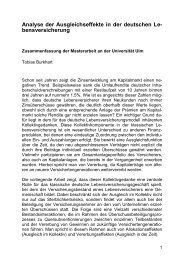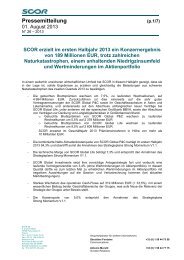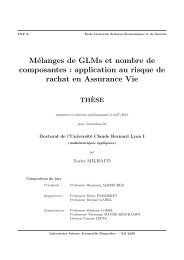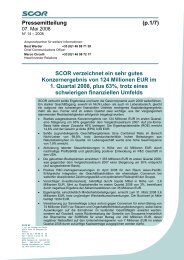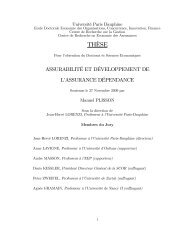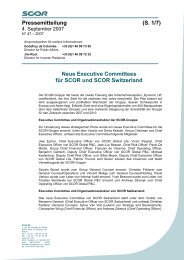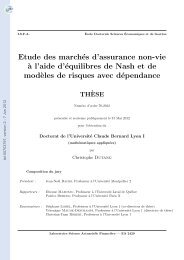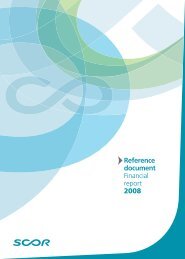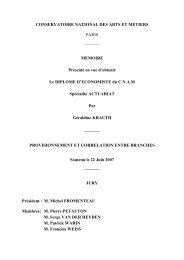4.4 Legal risk - Scor
4.4 Legal risk - Scor
4.4 Legal risk - Scor
You also want an ePaper? Increase the reach of your titles
YUMPU automatically turns print PDFs into web optimized ePapers that Google loves.
4.1.14 SCOR IS EXPOSED TO LOSSES DUE TO COUNTERPARTY DEFAULT RISKS OR CREDIT RISKS<br />
SCOR is mainly exposed to the following credit <strong>risk</strong>s:<br />
A. Bond portfolios<br />
Credit <strong>risk</strong>s on fixed and variable income securities cover two areas at <strong>risk</strong>.<br />
Firstly, a deterioration in the financial situation of an issuer (sovereign, public or private) may result in an increase in the<br />
relative cost of refinancing and a reduction in the liquidity of the securities issued leading to a reduction in the value of<br />
such securitiets. Secondly, the borrower’s financial situation can cause it to become insolvent and lead to the partial or<br />
total loss of coupons and of the principal the Group invested.<br />
The <strong>risk</strong> of losing all or part of bonds the Group owns could have a material adverse impact on its business, present and<br />
future revenues, net income, cash flows, financial position, and potentially, on the price of its securities.<br />
B. Receivables from retrocessionaires<br />
SCOR transfers part of its <strong>risk</strong>s to retrocessionaires via retrocession programs. The retrocessionaires then assume, in<br />
exchange for the payment of premiums by SCOR, the losses related to claims covered by the retrocession contracts. In<br />
the event of default of a retrocessionaire, SCOR would be liable to lose the coverage provided by its retrocessionaire<br />
whereas it would retain liability to the cedant for the payment of all claims covered under the reinsurance contract.<br />
Moreover, the Group is exposed to a credit <strong>risk</strong> in the event of a payment default by the retrocessionaires of the balance<br />
of the profit and loss retrocession account due in respect of its cession.<br />
The <strong>risk</strong> of non-performance of retrocessionaire undertakings is set out in “Section 4.1.6 – SCOR may be adversely<br />
affected by its cedants, retrocessionaires, insurers or members of pools in which it participates do not respect their<br />
obligations.”<br />
The retrocessionaires’ part in the reserves split by retrocessionaires’ financial rating is included in “Section 20.1.6 –<br />
Notes to the financial statements, Note 16 – Contract Liabilities.”<br />
In spite of the measures to control and reduce the <strong>risk</strong> of defaults of its retrocessionaires, the occurrence of one or more<br />
of such default could have a material adverse impact on SCOR’s business, its present and future premium income, its<br />
net income, its cash flows, its financial position, and potentially on the price of its securities.<br />
C. Receivables and deposits with cedants<br />
There are three aspects of credit <strong>risk</strong> related to contracts with cedants.<br />
Firstly, SCOR may be exposed to credit <strong>risk</strong> in relation to amounts deposited with ceding companies in respect of<br />
reserves which cover its current and future liabilities. Depositing these amounts does not a priori discharge the Group of<br />
its liability towards cedants in case it is not able to recover these amounts in the event of default of cedants.<br />
Secondly, SCOR is exposed to a credit <strong>risk</strong> in the event of a payment default by the cedants of the balance of the profit<br />
and loss reinsurance account due under its acceptance of a portion of their <strong>risk</strong>s.<br />
Thirdly, SCOR is exposed to a credit <strong>risk</strong> in the event of a payment default by the cedants of the premiums due under its<br />
acceptance of a portion of their <strong>risk</strong>s. In cases where such an event does not lead to termination of the reinsurance<br />
contract, any offset between contractual obligations between the two parties is dependent on court decisions, and it is<br />
possible that the Group will remain liable for paying claims without being able to offset the unpaid premiums.<br />
Thus, the inability of its cedants to fulfill their financial obligations could affect SCOR’s current and future revenues, net<br />
income, cash flow, financial position, and potentially the price of its securities.<br />
D. Receivables from non-(re)insurance debtors<br />
SCOR is exposed to a credit <strong>risk</strong> in the event of a payment default by a debtor not linked to the Group by a reinsurance<br />
or retrocession treaty. This can be, for instance, advances to providers, social security contribution collection agencies<br />
or states, or loans to employees, etc.<br />
The <strong>risk</strong> of losing all or part of receivables the Group owns could have a material adverse impact on its business,<br />
present and future revenues, net income, cash flows, financial position, and potentially, on the price of its securities.<br />
E. Cash deposits at banks<br />
SCOR is exposed to the <strong>risk</strong> of losing all or part of any cash deposited with a retail bank in the event such a bank is no<br />
longer able to honor its commitments (e.g., following liquidation).<br />
The current main <strong>risk</strong> for the Group is the significant concentration of deposits in a small number of banks. This <strong>risk</strong> is a<br />
direct result of the selection of the most stable banks.<br />
The inability of one or several banks to return its deposits to SCOR could have a material adverse impact on its<br />
business, present and future revenues, net income, cash flows, financial position, and potentially, on the price of its<br />
securities.<br />
31



